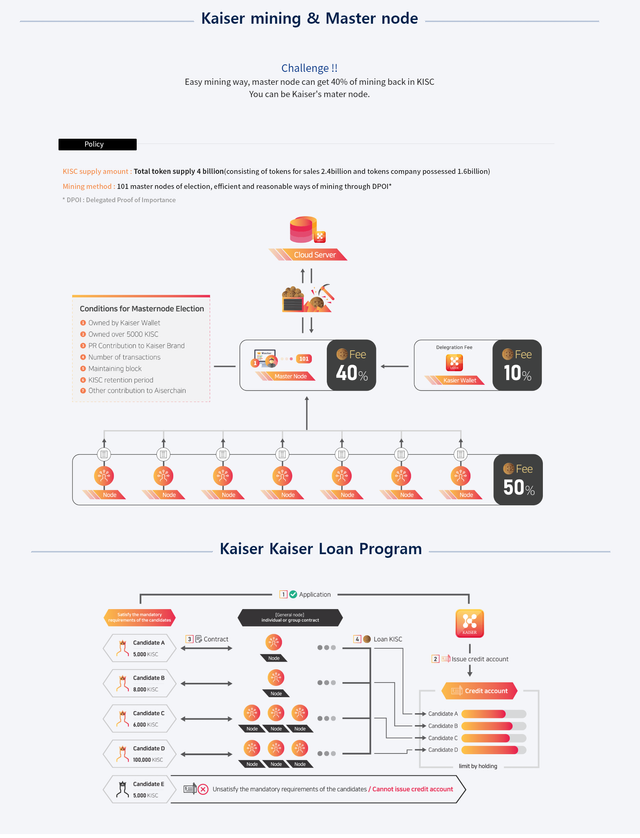Kaiser Mastenode Systen

Public Blockchain Policy
KISC* Mining
*KISC (Kaiser Coin)
The mining of Kaiser works on Cloud server and it‟s a binary method consisting of miners + master
nodes. The total supply of KISC is 4 billion and the sales volume is 2.4 billion (60% of the total supply),
and the issued company‟s holding amount is 1.6 billion(40% of the total supply).
Kaiser uses the DPOI(Delegated Proof of Importance) consensus algorithm, and evaluates the leve l of
contribution and coins are allocated depending on the contribution level to the liquidity and the
transaction of the coins. DPOI is a democracy style consensus format that only the top activated 101-
delegated stakeholders actively maintain ecosystem, secure security and their shares are delegated. It
just enables every node (miner) to mine through the continuous mining programs that the company
provides in order to sustain nodes aside from mining by master nodes. Through this, we build the
trusted network ecosystem of public blockchain.
The existing mining methods including POW, POS, DPOS only allows the individual to prove one‟s share
directly, takes a lot of electricity and time and also vulnerable in the attack of 51% dominating hash power.
Whereas DPOI algorithm of KISC has improved the existing inefficient methods in every aspect such as
electricity use, time consuming and mining speed etc.. DPOI policy of KISC pursues democracy and high
efficiency. A miner delegates its stake to a master node in security for coins, and the master node having
high mining performance ability is mandated to mine instead. Kaiser, this kind of a user-centered
decentralized service allows more chances of reward to return to the nodes who contribute to the chain
facilitation, and it will lead to persistent activities.
Once mining starts, the miner give the master node coins as a guarantee and the nodes receive rewards as
much as the ratio of coins that were taken as security out of the 50% of the completed mine coins. In this
structure, as miners do not need to work the server directly, even though a regular node is not directly
involved in mining, efficient mining through a master node can be done and it allows master nodes to do
economic activities by mining bigger volume of coins with the delegated coins to them in a short period of
time.
A master node means the top nodes of many nodes and the mining method of a master node has the
strength that its maintenance and management is available at low cost all the time. For the smooth
transaction between users, a master node performs a specific service. Since it takes a lot of time and cost to
perform the service, a certain amount of incentive is provided to them for the cost.
The selection standards of a master node are to put together at least, more than 5,000 KISCs, Kaiser Wallet
possession, the holding period of coins, the amount of coins they hold, average transaction times, the
maintaining blocks etc., the level of contribution to the network inside Aiserchain network, and finally 101
master modes are elected among the candidates with high average scores by real-time voting of regular
nodes. Every node has a right to vote, then the top 101 nodes who receive the most votes are delegated as
master nodes.(Voting doesn‟t guarantee that the delegated you voted for becomes a master node.) Also the
selected master nodes come to mine on Cloud Server according to their mining systems and they receive
40% of the mining amount as their commission. Master nodes don‟t need a specific mining hardware,
maintenance fee, time and labor consuming etc. perform reasonable and economic ways of mining. In
addition, each mined amount is indicated on the wallet linked APP and WEB. Then it makes it easy to figure
out the mining performance ability of each master node, and helps regular nodes to make reasonable
choices for their stake delegation. A master node not only receives 40% commission in compensation for
mining, but also is provided with the additional coin reward according to the average holding amount of the
coin within a certain period of time during the airdrop.
- Kaiser receives 10% fee by permitting master nodes to mine on Cloud server including the
implementation and management of the mining environment. Also, if a node wants to delegate mining
to the company, the company publishes it and performs the mining directly on behalf of the node.
Kaiser ICO : https://kisc.io/